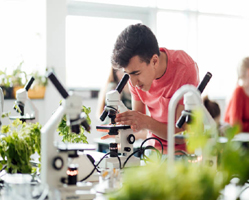Course DetailsHome / Courses Details
Biology
- Cell Biology: Structure and function of cells, cellular processes, and cell communication.
- Genetics: DNA, genes, heredity, genetic disorders, and biotechnology.
- Evolution: Natural selection, speciation, and the history of life on Earth.
- Ecology: Interactions between organisms and their environments, ecosystems, and biodiversity.
- Human Biology: Anatomy, physiology, and the functioning of the human body.
- Microbiology: Study of microorganisms, including bacteria, viruses, fungi, and protozoa.

Cell biology is the branch of biology that studies the structure, function, and behavior of cells, which are the basic units of life. Cells are the building blocks of all living organisms, from single-celled bacteria to complex multicellular organisms like humans. This field delves into the intricate workings of cells, including the processes of cell division, energy production, and communication between cells. Key structures within cells, such as the nucleus, mitochondria, and cell membrane, play vital roles in maintaining cellular functions and overall organismal health. Advances in cell biology have profound implications for understanding diseases, developing medical treatments, and advancing biotechnological applications.
Genetics is the field of biology that focuses on the study of genes, heredity, and genetic variation in living organisms. It explores how traits are passed from parents to offspring through DNA, the molecule that contains the genetic instructions for the development, functioning, growth, and reproduction of all known living organisms. Genetic research has uncovered the mechanisms of genetic inheritance and mutation, leading to advances in understanding diseases, improving agricultural practices, and enabling biotechnological innovations like gene editing. Technologies such as CRISPR have revolutionized genetics by allowing precise modifications to DNA, offering potential cures for genetic disorders and enhancing our ability to manipulate organisms for various beneficial purposes.
Evolution is the process through which species of organisms undergo changes over time through variations in their genetic makeup. These changes can lead to the development of new species and are driven by mechanisms such as natural selection, genetic drift, mutation, and gene flow. Natural selection, a concept introduced by Charles Darwin, posits that individuals with advantageous traits are more likely to survive and reproduce, passing those traits to future generations. Over long periods, these small genetic variations accumulate, leading to significant evolutionary transformations. Fossil records, comparative anatomy, and molecular biology provide evidence for the theory of evolution, demonstrating the shared ancestry and diversity of life on Earth. Evolutionary biology not only explains the origin and adaptation of species but also helps in understanding the complexity of biological systems and the interrelatedness of all living organisms.
Ecology is the branch of biology that studies the interactions between organisms and their environment. It examines how organisms adapt to their habitats, the flow of energy and nutrients through ecosystems, and the complex relationships within biological communities. Ecologists investigate various levels of organization in nature, from individual organisms and populations to communities, ecosystems, and the biosphere as a whole. Key concepts in ecology include food webs, biodiversity, and the impact of environmental factors like climate, soil, and water on living organisms. Understanding ecological principles is crucial for addressing environmental challenges such as habitat destruction, climate change, and conservation of endangered species. By studying these interactions, ecologists aim to develop sustainable practices that support both human needs and the health of our planet's ecosystems.
